commercedepartment
Latest
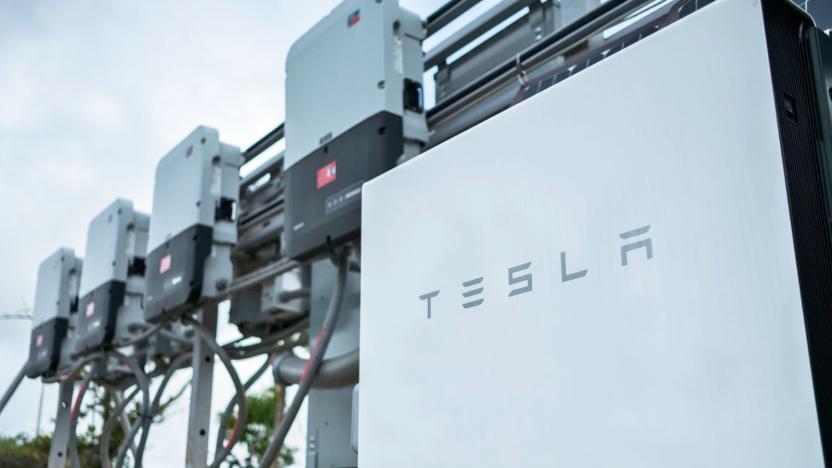
Tesla granted tariff exemption on Japanese aluminum for battery cells
Tesla has won an exemption from paying the 10 percent tariffs placed on imported aluminum from Japan. It filed a request with the Commerce Department in April for a tariff exclusion on 10 million kilograms of the metal per year from Nippon Light Metal Co for battery cells made in the Nevada Gigafactory. The department approved it this month.

Trump administration suggests firmer controls on data privacy
The National Telecommunications and Information Administration (NTIA) has laid out the Trump administration's approach to bolstering data privacy. The agency is seeking to strike a balance between increased consumer protection and affording companies room to innovate with its proposals, which could lead to a US version of the EU General Data Protection Regulation (better known as GDPR).
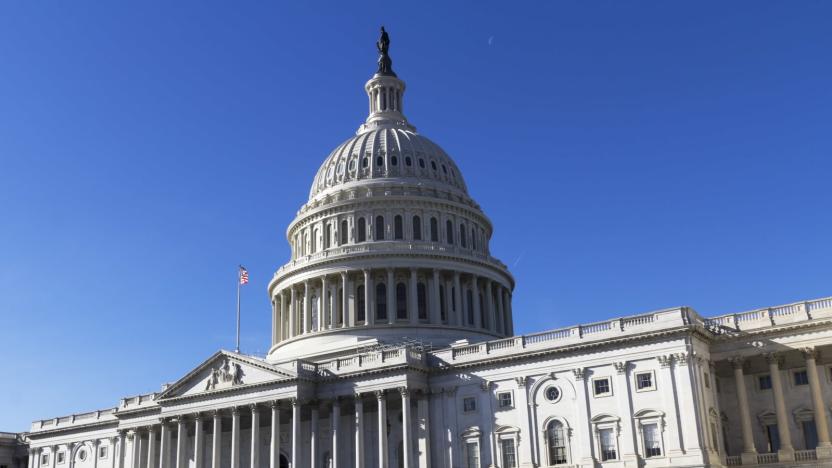
Senate gives up on ZTE sanctions
Though a number of US senators have been seeking to block President Trump's deal with ZTE that lets the Chinese firm circumvent sanctions put into place by US officials earlier this year, they have now backed off on that effort. In June, the Senate passed a version of the National Defense Authorization Act that reinstated sanctions against ZTE and would effectively nullify the president's and Commerce Department's deal with the firm. However, the House of Representatives passed a version of the bill without such language and the two chambers have been working on a compromise bill that marries each of their versions. Senators have now decided to abandon the ZTE sanctions in exchange for more oversight for the Committee on Foreign Investment in the US (CFIUS).
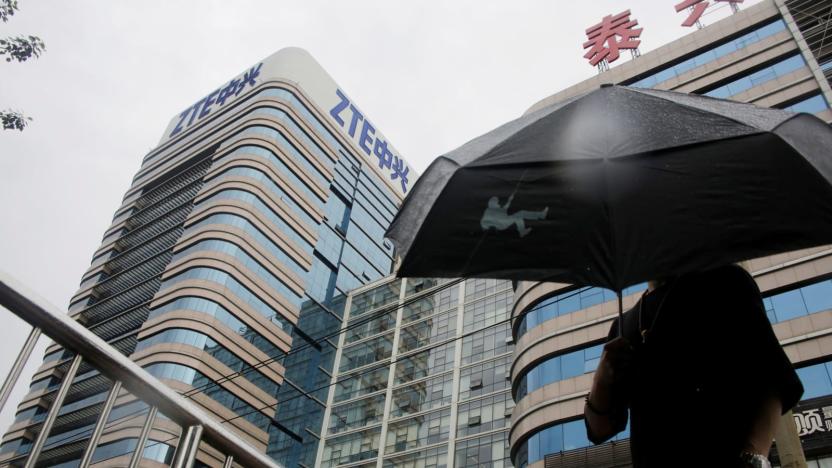
US lifts ZTE export ban
ZTE has another chance at redemption. The US Commerce Department has lifted the export ban on the Chinese mobile giant now that it has met all the terms required to get a full reprieve. Officials confirmed that ZTE had put $400 million in escrow on top of other requirements, including the payment of a $1 billion fine, replacing key leadership and accepting outside monitors that will ensure it honors US export controls.

US says ZTE can resume limited business while sanctions are debated
The Trump administration has handed ZTE another lifeline, Bloomberg reports, allowing it to resume certain business activities while US lawmakers decide how to deal with the company going forward. In April, the US Commerce Department banned ZTE from working with US companies after the company shipped US-made parts to Iran and North Korea -- in violation of US trade sanctions -- and then lied about giving the executives involved with those deals large bonuses. Though the Trump administration is looking to offer ZTE a reprieve, some members of Congress would like to see certain sanctions stay in place. And while the two sides try to work that out, ZTE will be allowed to keep providing some services.
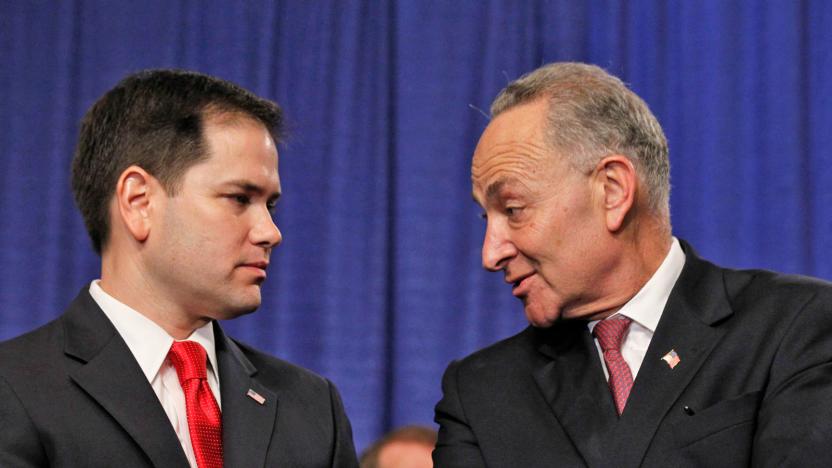
Bipartisan Senate effort aims to override Trump’s deal to save ZTE
A bipartisan group of Senators has added language to the National Defense Authorization Act that would reinstate sanctions on Chinese firm ZTE, the Wall Street Journal reports. The legislation is set to be voted on this week. If it passes in the Senate -- and it's expected to -- it could override a deal that President Trump and the Commerce Department have put in place that would allow ZTE to once again purchase necessary components from US suppliers.
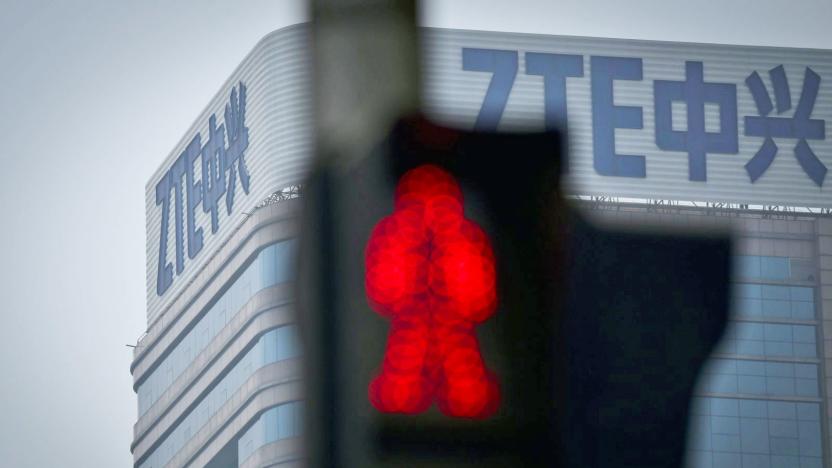
Trump administration tells Congress it has deal to save ZTE
The US government should soon act on its promise to give ZTE another chance following its revived export ban. The New York Times has learned that the Trump administration has informed Congress of a Commerce Department deal that would let ZTE take American exports as long as it accepted new penalties. It would have to pay a "substantial" fine, shake up its management team and hire American compliance officers to keep it on the straight and narrow.

US and Chinese presidents work to get ZTE 'back into business'
ZTE's future is currently grim in light of the revived US export ban, but is it guaranteed to wither and die? Not necessarily. President Trump has tweeted that he and Chinese President Xi Jinping are "working together" to give ZTE a "way to get back into business." Just how that would happen wasn't clear, but he told the US Commerce Department to "get it done."
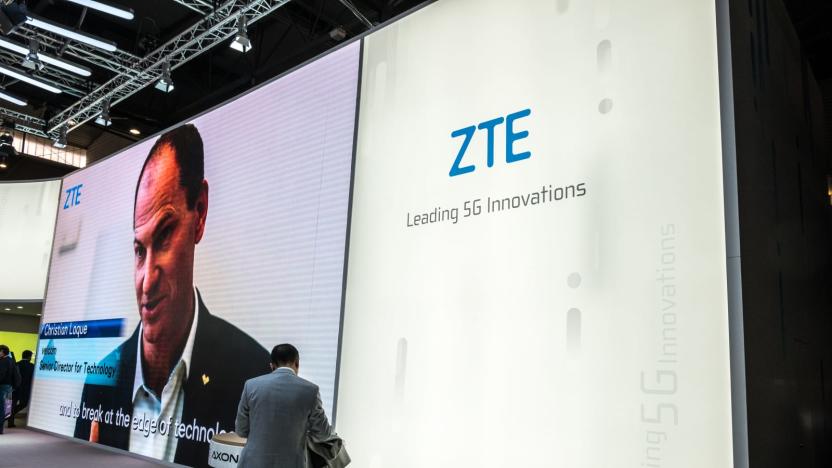
ZTE faces revived US export ban over false statements
When the US Commerce Department slapped ZTE with $1.19 billion in penalties for illegally shipping telecom gear to Iran and North Korea (and making false claims about it), it offered a reprieve: it would suspend a seven-year export ban as long as the Chinese company honored an agreement and didn't break the rules again. Apparently, ZTE might have blown its chance at a break. Department officials have revived an order banning ZTE from exporting US products after accusing the company of lying about punishing those involved in the scandal.
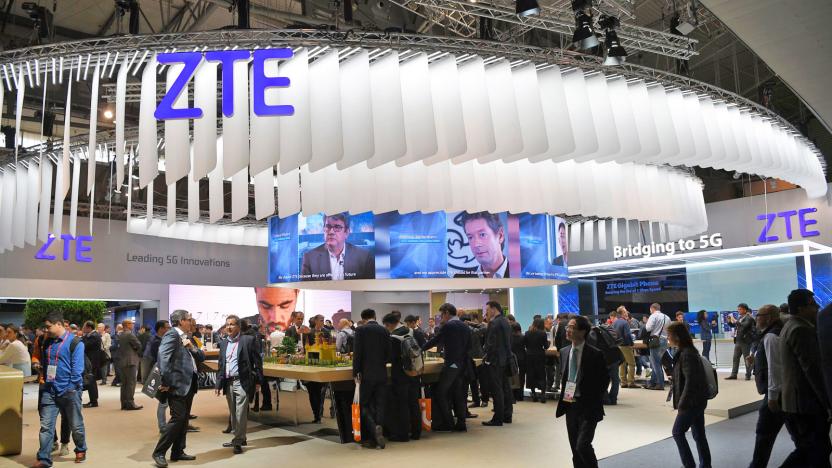
ZTE will pay $1.19 billion for violating US trade sanctions
ZTE is still feeling the pain from its alleged violation of US trade sanctions against Iran and North Korea. The Chinese tech giant has reached an agreement with the Commerce Department to both plead guilty to violation charges and pay a total of $1.19 billion ($892 million in the Iran case) as a penalty. That's a stiff cost, but ZTE didn't have much choice. The US' sanctions against the company, suspended while the two sides negotiated a deal, would have crippled its business by largely denying access to crucial American parts like Qualcomm's mobile processors.

US reduces its internet oversight
After lengthy delays and no small amount of political opposition, it's official: the US has given up a key aspect of internet oversight. As of October 1st, the Internet Corporation for Assigned Names and Numbers (the outfit that manages the domain name system) is no longer under the watch of the US' National Telecommunications and Information Administration. ICANN is now a private, non-profit organization that will take its input from academics, companies, governments and the public. While the American government didn't really wield its influence, it no longer has that option.

ZTE faces restrictions on using US technology
Chinese companies already have a hard time doing business with the US (mostly over spying fears), and it's about to get worse. Reuters sources understand that the US Commerce Department is about to slap ZTE with restrictions on what it's allowed to import from its American suppliers. From March 8th onward, those companies will reportedly need to apply for export licenses to ship anything to ZTE, and those grants will "generally be denied." The move would be punishment for allegedly breaking export rules by shipping US tech to Iran.

Commerce Department gets its first ever Chief Data Scientist
Want proof that US officials are taking data seriously? Just look at the Commerce Department. It's following in the White House's footsteps by hiring its first ever Chief Data Scientist, Jeff Chen. He'll make sure that the department is making the most of data across the many, many fields it covers: he could improve predictions for severe weather, for example, or help modernize the US' creaky patent system. Chen certainly has the experience to back it up, having worked with everyone from NASA to the White House's own Office of Science and Technology Policy. There's only so much he can do in the new role, but it won't be surprising if he gets the wheels of government turning considerably faster. [Image credit: Getty Images]

US to reduce its oversight of a key internet governor, but don't expect big changes
The US government has been gradually reducing its influence over the internet ever since it offloaded domain management responsibilities to ICANN back in the late 1990s, and today it took an important (if mostly symbolic) step toward severing those connections for good. The Department of Commerce has asked ICANN to work on a transition plan that will end American monitoring of the firm, letting it run independently. The only major stipulations are that the resulting system is free of government control, maintains cooperative governance and fosters an open internet. The transition was always going to be in the cards at some point, but the proposal request is a gesture toward an international community worried that a surveillance-happy US has too much say over what happens online. Don't be too quick to celebrate, though. A big policy change is unlikely, at least in the short term -- the Commerce Department has only had limited practical control. Also, ICANN itself only has so much reach. While it does watch over domain names and network addresses, it can't completely block sites or open them up to spies. At the moment, the shift is more about fulfilling promises and reassuring global partners than anything else.

Department of Commerce and NTIA suggest spectrum sharing for government and commercial services
In 2010 President Obama stated, in no uncertain terms, that our country's competitive edge and technological leadership were conditional on our ability to open up broad swaths of spectrum for commercial and governmental use. Two years later, we've made progress, but our wireless providers are still struggling to keep up as our demand for cellular broadband skyrockets -- even spectrum hog Verizon claims to be gasping for air. The Commerce Department and US National Telecommunications and Information Administration are suggesting a new approach to opening up the airwaves to carriers that doesn't involve the wholesale abandonment of radiowave real estate by its current residents. The NTIA thinks there is room for both federal agencies and companies in the 95MHz between 1755 and 1850MHz. This would open up the prime spectrum to commercial use, but would also save the time and money normally needed to relocate existing government services which, in this case, includes military communications and missile guidance systems. In typical bureaucratic fashion, more study will be needed before a formal recommendation can be made to the FCC. But, there's plenty more detail to be had in the meantime -- just check out the PR after the break and the full report at the source link.[Tower photo via Shutterstock]

White House gets behind online 'bill of rights,' companies to adopt 'do not track'
President Obama is throwing his weight behind a consumer bill of rights that includes protections against online companies in particular, and aims to safeguard customer privacy. While the plan doesn't come prepackaged with a new set of laws for companies to abide by, the Commerce Department is working to develop enforceable policies with help from the concerned parties. The bedrock of the new bill of rights is that consumers should have control over the kind of data companies collect and what they do with it. Internet firms would have to be transparent about what information is gathered and how it's used. There is also a call for limitations on the use of certain personal data. As part of the push a number of major players in the field, including Google, have agreed to include a "Do Not Track" button in their browsers and to honor the system -- the latter being a tiny detail that has made implementations of the feature ineffective until now. Hit up the source links for a few more details.

Obama administration moves forward with unique internet ID for Americans, Commerce Department to head system up
President Obama has signaled that he will give the United States Commerce Department the authority over a proposed national cybersecurity measure that would involve giving each American a unique online identity. Other candidates mentioned previously to head up the new system have included the NSA and the Department of Homeland Security, but the announcement that the Commerce Department will take the job should please groups that have raised concerns over security agencies doing double duty in police and intelligence work. So anyway, what about this unique ID we'll all be getting? Well, though details are still pretty scant, U.S. Commerce Secretary Gary Locke, speaking at an event at the Stanford Institute, stressed that the new system would not be akin to a national ID card, or a government controlled system, but that it would enhance security and reduce the need for people to memorize dozens of passwords online. Sorry, Locke, sounds like a national ID system to us. Anyway, the Obama administration is currently drafting what it's dubbed the National Strategy for Trusted Identities in Cyberspace, which is expected at the Department of Commerce in a few months. We'll keep you posted if anything terrifying or cool happens. Update: For clarity's sake, we should note that the proposed unique ID system will be opt in only, not a mandatory program for all citizens.

White House reportedly pushing for new internet privacy laws, policy office
It's not official just yet, but The Wall Street Journal is reporting that the Obama administration is about to make a major push for some new internet privacy laws, and for the creation of a new federal position to oversee the effort. According to the usual "people familiar with the situation," the Commerce Department is now drafting a report with a series of recommendations on the matter, which is expected to be released in the "coming weeks" -- although those same people also note that nothing is final, and things could still change. Assuming it does go through, however, a White House task force would then take the report and work on turning the recommendations into policy. As The Wall Street Journal notes, the new laws would be filing something of a significant gap, as the US doesn't currently have any comprehensive laws protecting consumers' internet privacy -- a fact fully evidenced by countries like Canada, Germany and the UK taking the lead in recent privacy battles with Google and Facebook.

White House gets involved in spectrum fight, says more is needed for competition's sake
The Fed's already been aggressively moving to get out ahead of this impending spectrum crisis that everyone seems to be predicting these days, but now the NTIA -- the Commerce Department's National Telecommunications and Information Administration -- is chiming in, and the sentiment pretty much echoes what's already been said by everyone else (besides the broadcast TV peeps, that is). The NTIA's coming at it from the angle that wired broadband alone won't be enough to support sufficient competition for rural internet access, something that the FCC has made a priority, and that digging up free airwaves is now "a primary tool for promoting broadband competition." They've got some headwind and plenty of bigwig opposition to make that a reality, but there's some hope for freeing up a few slivers of government-owned spectrum as well; at any rate, it's said an additional 300MHz is necessary to keep pace with demand over the next six years, so it'll take a small miracle to keep everyone out of a crunch.

Digital TV switch facing hurdle over...postage stamps?
We expected some potential issues concerning the analog TV shutoff next year, but even we (and apparently the Commerce Department) could not have predicted they'd run low on stamps necessary to send out $40 discount coupons for digital television converters. Apparently nearly 60% of the coupons sent out expired before they were actually used -- maybe people are waiting to see which digital converter to buy -- resulting in n unexpected number of new mailings. Funds from the unused coupons goes back to the program and will still be available for more requests, however the budgeted administrative funds to actually mail the things is limited, and may need to be expanded. According to Reuters, the NTIA should have a clearer picture after July 1, but this could cause some issues for those still waiting to request the discount.





